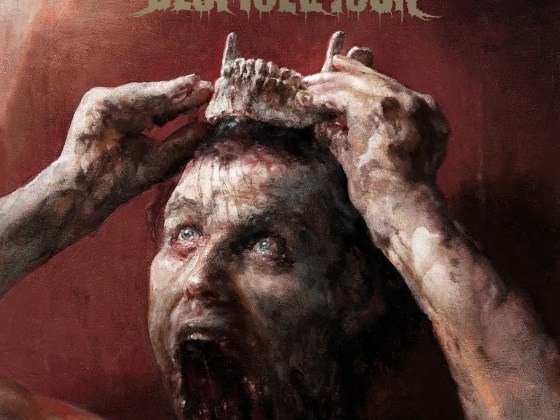SikTh are considered by many to have been incredibly influential to progressive metal, and have been stated by numerous prominent artists to have been inspirational to their own songwriting. However in a somewhat strange turn of events, it so happened that SikTh reached quite a large new audience over a year after their indefinite hiatus commenced (due to member departure and commitment to other projects) and this was partly due to Misha Mansoor (guitarist of Periphery) citing them as an influence. This hiatus lasted for 6 years, broken by a surprise announcement that they would be performing a reunion set at Download Festival.
‘The Future In Whose Eyes?’ is the first full-length release from SikTh since 2006’s classic ‘Death Of A Dead Day’ and their 2015 comeback EP ‘Opacities’.
Album opener “Vivid” has no holds barred, immediately launching the listener into frantically syncopated grooves. Far from being a one-trick pony, the track’s aggressive rhythms and dissonance make way for melodic slower riffs reminiscent of Soilwork, which in turn pave the way for technical guitar solos and driving riffs – all of which is overlaid with SikTh’s somewhat signature approach to vocals. This vocal approach is to break almost every mold you could imagine; occasionally you’ll hear lines halfway between yelling and singing and others that could almost come across as comical if the setting were different. Although they’re highly unorthodox, the execution is top-notch, and instead of coming across as weird, you’re delivered a vocal performance that is so far removed from the trend, it’s not funny. And as a result, it’s not only a breath of fresh air but also incredibly interesting at the same time.

‘The Future In Whose Eyes?’ also includes narrated interlude tracks “This Ship Has Sailed” and “The Moon’s Been Gone For Hours”, which consist of tense and gritty vocals reciting dark poetry wrapped in foreboding soundscapes. Serving not only as an excellent palate-cleanser and a break from the often hard-hitting nature of the tracks, these interludes shift in dynamics, and the deep nature of these pieces encourage scrutiny and introspection into the current state of humanity. The closing track “When it Rains” contains the same narration but has an undercurrent of positivity – a stark juxtaposition to the tone of voice with which the message is delivered.
[metalwani_content_ad]
“Riddles of Humanity” launches into riffing so furious that it would make even hardened Meshuggah fans blush. Filled with complex shifting patterns and aggressive melodies, it’s easy to see why so many musicians have taken inspiration from SikTh in the djent and prog metal scene. However the highlights in these songs (and indeed the album as a whole) aren’t the technicality or brutality of the music, but the skill with which it’s utilised. Sikth display mature songwriting and a mastery of writing tracks which are memorable without compromising on musical proficiency or sounding forced.
SikTh will punch you in the stomach with incredible riffs, soothe you with gentle melodies, challenge you with exotic vocal styles, and captivate you with their songwriting. If you’re a fan of chaotic metal with a strong sense of melody, ‘The Future In Whose Eyes?’ is for you.







